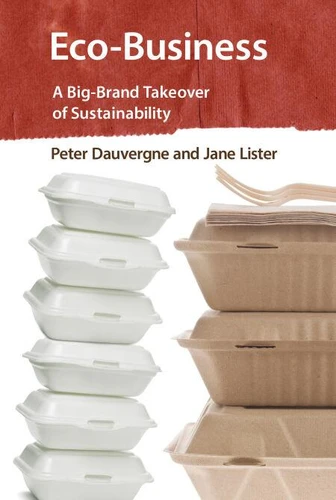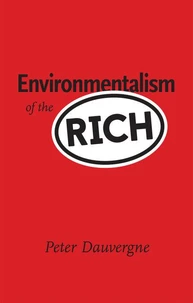Eco - Business. A Big - Brand Takeover of Sustainability
Par : ,Formats :
Disponible dans votre compte client Decitre ou Furet du Nord dès validation de votre commande. Le format ePub protégé est :
- Compatible avec une lecture sur My Vivlio (smartphone, tablette, ordinateur)
- Compatible avec une lecture sur liseuses Vivlio
- Pour les liseuses autres que Vivlio, vous devez utiliser le logiciel Adobe Digital Edition. Non compatible avec la lecture sur les liseuses Kindle, Remarkable et Sony
- Non compatible avec un achat hors France métropolitaine
 , qui est-ce ?
, qui est-ce ?Notre partenaire de plateforme de lecture numérique où vous retrouverez l'ensemble de vos ebooks gratuitement
Pour en savoir plus sur nos ebooks, consultez notre aide en ligne ici
- Nombre de pages204
- FormatePub
- ISBN978-0-262-31307-0
- EAN9780262313070
- Date de parution01/03/2013
- Protection num.Adobe DRM
- Taille1 Mo
- Infos supplémentairesepub
- ÉditeurThe MIT Press
Résumé
Two experts explain the consequences for the planet when corporations use sustainability as a business tool. McDonald's promises to use only beef, coffee, fish, chicken, and cooking oil obtained from sustainable sources. Coca-Cola promises to achieve water neutrality. Unilever seeks to achieve 100 percent sustainable agricultural sourcing by 2020. Walmart has pledged to become carbon neutral. Big-brand companies seem to be making commitments that go beyond the usual "greenwashing" efforts undertaken largely for public-relations purposes.
In Eco-Business, Peter Dauvergne and Jane Lister examine this new corporate embrace of sustainability, its actual accomplishments, and the consequences for the environment. For many leading-brand companies, these corporate sustainability efforts go deep, reorienting central operations and extending through global supply chains. Yet, as Dauvergne and Lister point out, these companies are doing this not for the good of the planet but for their own profits and market share in a volatile, globalized economy.
They are using sustainability as a business tool. Dauvergne and Lister show that the eco-efficiencies achieved by big-brand companies limit the potential for finding deeper solutions to pressing environmental problems and reinforce runaway consumption. Eco-business promotes the sustainability of big business, not the sustainability of life on Earth.
In Eco-Business, Peter Dauvergne and Jane Lister examine this new corporate embrace of sustainability, its actual accomplishments, and the consequences for the environment. For many leading-brand companies, these corporate sustainability efforts go deep, reorienting central operations and extending through global supply chains. Yet, as Dauvergne and Lister point out, these companies are doing this not for the good of the planet but for their own profits and market share in a volatile, globalized economy.
They are using sustainability as a business tool. Dauvergne and Lister show that the eco-efficiencies achieved by big-brand companies limit the potential for finding deeper solutions to pressing environmental problems and reinforce runaway consumption. Eco-business promotes the sustainability of big business, not the sustainability of life on Earth.
Two experts explain the consequences for the planet when corporations use sustainability as a business tool. McDonald's promises to use only beef, coffee, fish, chicken, and cooking oil obtained from sustainable sources. Coca-Cola promises to achieve water neutrality. Unilever seeks to achieve 100 percent sustainable agricultural sourcing by 2020. Walmart has pledged to become carbon neutral. Big-brand companies seem to be making commitments that go beyond the usual "greenwashing" efforts undertaken largely for public-relations purposes.
In Eco-Business, Peter Dauvergne and Jane Lister examine this new corporate embrace of sustainability, its actual accomplishments, and the consequences for the environment. For many leading-brand companies, these corporate sustainability efforts go deep, reorienting central operations and extending through global supply chains. Yet, as Dauvergne and Lister point out, these companies are doing this not for the good of the planet but for their own profits and market share in a volatile, globalized economy.
They are using sustainability as a business tool. Dauvergne and Lister show that the eco-efficiencies achieved by big-brand companies limit the potential for finding deeper solutions to pressing environmental problems and reinforce runaway consumption. Eco-business promotes the sustainability of big business, not the sustainability of life on Earth.
In Eco-Business, Peter Dauvergne and Jane Lister examine this new corporate embrace of sustainability, its actual accomplishments, and the consequences for the environment. For many leading-brand companies, these corporate sustainability efforts go deep, reorienting central operations and extending through global supply chains. Yet, as Dauvergne and Lister point out, these companies are doing this not for the good of the planet but for their own profits and market share in a volatile, globalized economy.
They are using sustainability as a business tool. Dauvergne and Lister show that the eco-efficiencies achieved by big-brand companies limit the potential for finding deeper solutions to pressing environmental problems and reinforce runaway consumption. Eco-business promotes the sustainability of big business, not the sustainability of life on Earth.







